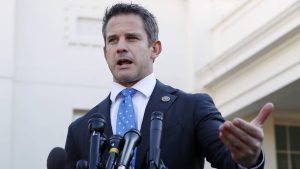On the first day of questioning in her confirmation hearings, Supreme Court nominee Ketanji Brown Jackson defended herself against Republican attacks about her record even before GOP senators had a chance to ask.
What You Need To Know
- On the first day of questioning in her confirmation hearings, Supreme Court nominee Ketanji Brown Jackson defended herself against Republican attacks about her record even before GOP senators had a chance to ask
- Senate Judiciary Committee Chairman Dick Durbin, D-Ill., preemptively inquired about Jackson’s views on child pornography offenders as well as her work as a public defender representing Sept. 11 terror suspects
- Jackson, the first Black woman to be nominated for the Supreme Court, said accusations that she goes easy on child porn offenders “could be further from the truth”
- She also said “federal public defenders don’t get to pick their clients, but added she believed there were legitimate questions about whether the U.S. judicial system was treating 9/11 suspects fairly.
Senate Judiciary Committee Chairman Dick Durbin, D-Ill., preemptively inquired about Jackson’s views on child pornography offenders as well as her work as a public defender representing Sept. 11 terror suspects.
Sen. Josh Hawley, R-Mo., has indicated that he plans to ask Jackson about what he called in a tweet last week “an alarming pattern when it comes to Judge Jackson’s treatment of sex offenders, especially those preying on children.” He accused her of “having a “pattern of letting child porn offenders off the hook for their appalling crimes” as a district court judge and former vice chair of the U.S. Sentencing Commission.
Jackson, the first Black woman to be nominated for the Supreme Court, gave a forceful, impassioned answer when asked about Hawley’s accusations.
“As a mother and a judge who has had to deal with these cases, I was thinking that nothing could be further from the truth,” she said.
Jackson, who currently serves on the U.S. Court of Appeals in the District of Columbia, called child pornography a “sickening and egregious crime” and said she has tried to ensure that “the children’s voices are represented in my sentences.”
“I tell them (the offenders) about the adults who were former child sex abuse victims, who tell me that they will never have a normal adult relationship because of this abuse,” she said. “I tell them about the ones who say, ‘I went into prostitution, I fell into drugs because I was trying to suppress the hurt that was done to me as an infant.’”
She defended her decision to hand out some sentences that were lighter than what federal guidelines called for, suggesting those recommendations, which take into account the volume of pornographic material an offender had, might be outdated in the internet age because “it’s not doing the work of differentiating who is a more serious offender in the way that it used to.”
In most of the child pornography cases where she imposed lighter sentences than federal guidelines suggested, prosecutors or others representing the Justice Department generally argued for sentences that were lighter than those recommended by federal guidelines.
While working in the federal public defender’s office in the District of Columbia, Jackson was assigned four Guantanamo Bay detainees, later continuing some of her work with them in private practice.
“Federal public defenders don’t get to pick their clients,” she testified Tuesday. “They have to represent whoever comes in, and it’s a service. That’s what you do as a federal public defender. You are standing up for the constitutional value of representation.”
But she also said she believed there were legitimate questions about whether the U.S. judicial system was treating suspects fairly.
“This had never happened before — not only the attack, but also the use of executive authority to detain people in this way,” she said. “And there were a lot of questions that the court was asking. The Supreme Court had taken a series of cases to try to understand what are the limits of executive authority, which is important. All of our liberty is at stake if we don’t get it right, in terms of what the executive can do.”
Those 9/11 suspects Jackson represented who were charged had those charges dropped, and all were eventually released. None was convicted by the military commissions created to try detainees.
In his questioning, Sen. Lindsey Graham, D-S.C., said he had no issue with Jackson defending Guantanamo detainees. He, however, grilled her on filing briefs as a private attorney that argued against the executive branch ordering their indefinite detention.
“Respectfully, Senator, it was not my argument,” Jackson explained. “I was filing an amicus brief on behalf of clients including, the Rutherford Institute, the Cato Institute and the Constitution Project.”
“When you sign on to a brief, does it not become your argument?” Graham asked.
“It is not, Senator, if you are an attorney and you are representing a client,” Jackson answered.
“Advocates to change this system, like she was advocating, would destroy our ability to protect this country,” Graham told Durbin in a heated exchange. “We’re at war; we’re not fighting a crime. This is not some passage-of-time event. As long as they’re dangerous, I hope they all die in jail if they’re going to go back to kill Americans.”
Graham, who earlier had cited recidivism rates of Guantanamo detainees, stormed out of the hearing room immediately after that rant.
Graham publicly lobbied for President Joe Biden to nominate U.S. District Court Judge J. Michelle Childs, a fellow South Carolinian, for the Supreme Court seat being vacated by the retiring Stephen Breyer. The South Carolina Republican accused progressive groups of engaging in an organized campaign to damage Childs’ chances in order to push Biden into nominating a more liberal candidate.
“All I can say is the fact that so many of these left-wing radical groups that would destroy the law as we know it declared war on Michelle Childs and supported you is problematic for me,” Graham said.
Sen. Dianne Feinstein, D-Calif., opened up her line of questioning by asking about reproductive rights, which comes as the country awaits the high court’s ruling in a major case related to Mississippi’s 15-week abortion ban and could significantly weaken the landmark decisions in Roe v. Wade and Planned Parenthood v. Casey.
“Roe and Casey are the settled law of the Supreme Court concerning the right to terminate a woman’s pregnancy,” Jackson said.
Jackson also refused to weigh in on questions about expanding the Supreme Court, calling it a “policy question for Congress.” She said she believed judges should not answer questions about political issues. She also said the Supreme Court has established an individual’s right to bear arms as a “fundamental right.”
The 51-year-old jurist also described her three-pronged judicial philosophy. She said she first tries to ensure she’s “proceeding from a position of neutrality” by clearing her mind of “any preconceived notions about how the case might come out and setting aside any personal views.” She said she then takes into account the parties’ arguments and the factual record. The final step is the “interpretation and application of the law to the facts in the case” as well as court precedent, Jackson said.
“I have developed a methodology that I use in order to ensure that I am ruling impartially and that I am adhering to the limits on my judicial authority,” she said. “I am acutely aware that as a judge in our system, I have limited power and I am trying in every case to stay in my lane.”
She later added that she thinks her record “clearly demonstrates that I am an independent jurist that I am ruling in every case consistent with the methodology that I’ve described, that I’m impartial. I don’t think that anyone can look at my record and say that it is pointing in one direction or another that it is supporting one viewpoint or another.”
Not only would Jackson make history as the first Black woman on the high court, she would be just the third Black person, the second woman of color and the sixth woman to become a justice. If nominated, there would be four women on the court — accounting for nearly half the seats — for the first time.
“Since I was nominated to this position, I have received so many notes and letters and photos from little girls around the country who tell me that they are so excited for this opportunity and that they have thought about the law in new ways — because I am a woman, because I’m a Black woman, all of those things people have said have been really meaningful to them” Jackson said, answering a question from Feinstein. “And and we want, I think, as a country, for everyone to believe that they can do things like sit on the Supreme Court. And so having meaningful numbers of women and people of color, I think, matters. I also think that it it supports public confidence in the judiciary when you have different people because we have such a diverse society.”
On Monday, Jackson and Judiciary Committee members gave their opening remarks.
Tuesday and Wednesday’s sessions consist of lawmakers questioning Jackson. On Thursday, outside witnesses and the American Bar Association — which on Friday said Jackson was “well qualified,” its highest rating — will deliver testimony.
This article is about an ongoing hearing. Please check back for updates.
The Associated Press contributed to this report.




